Visitors from around the world welcomed, visa-free entry helps boost sector
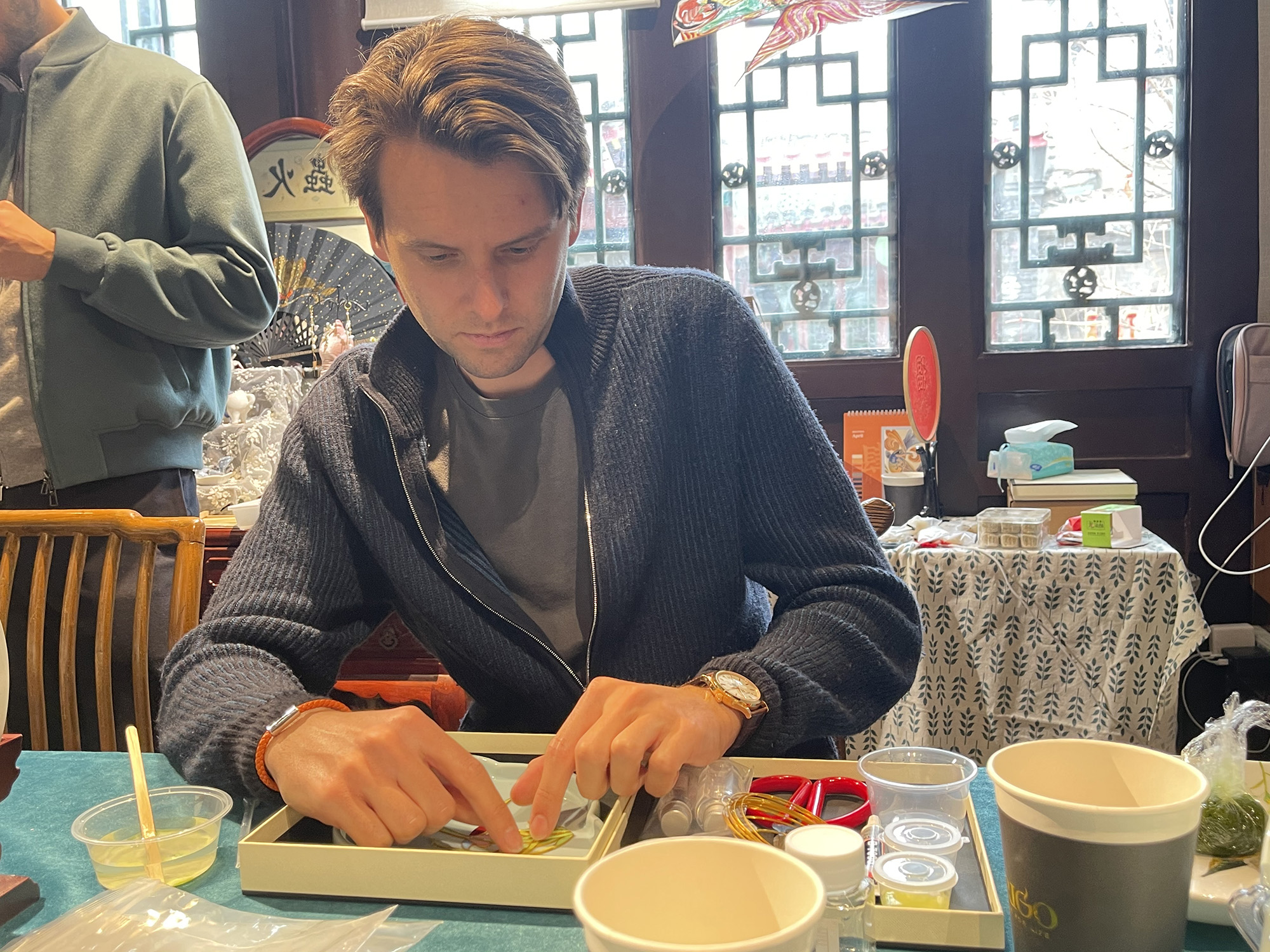
Maximilian Klaus Puechler from Germany crammed in as much sightseeing as he could during his short trip to Beijing in late March.
In one day, Puechler, in his 20s, visited the Juyongguan section of the Great Wall and the royal gardens at the Summer Palace as well as viewed the ancient architecture at the Temple of Heaven.
He was especially impressed by a culturally immersive experience at the temple, where he learned about traditional Chinese architectural oil painting, and tried techniques such as the gilding and decorative application of gold powder to the surface of a painting.
At the end of the tour, he was given a dragon-shaped hat by a staff member at the temple as a gift.
"As a tourist, I felt everyone's hospitality. People would come up to me and strike up a conversation, and that's really nice," Puechler said.
Talina Hotz from Switzerland took a special shine to the exhibitions at the Temple of Heaven. She said they helped her gain a better appreciation of the temple's history and structure as well as cultural aspects, such as the Hall of Prayer for a Good Harvest, a magnificent triple-gabled circular building.
"I'm really interested in Chinese cultural heritage, and I really enjoyed it," she said. Hotz said she was also impressed that so many people on her tour had enjoyed the experience.
The two Europeans are among a growing number of international travelers who have benefited from China's recent visa-free entry policy.
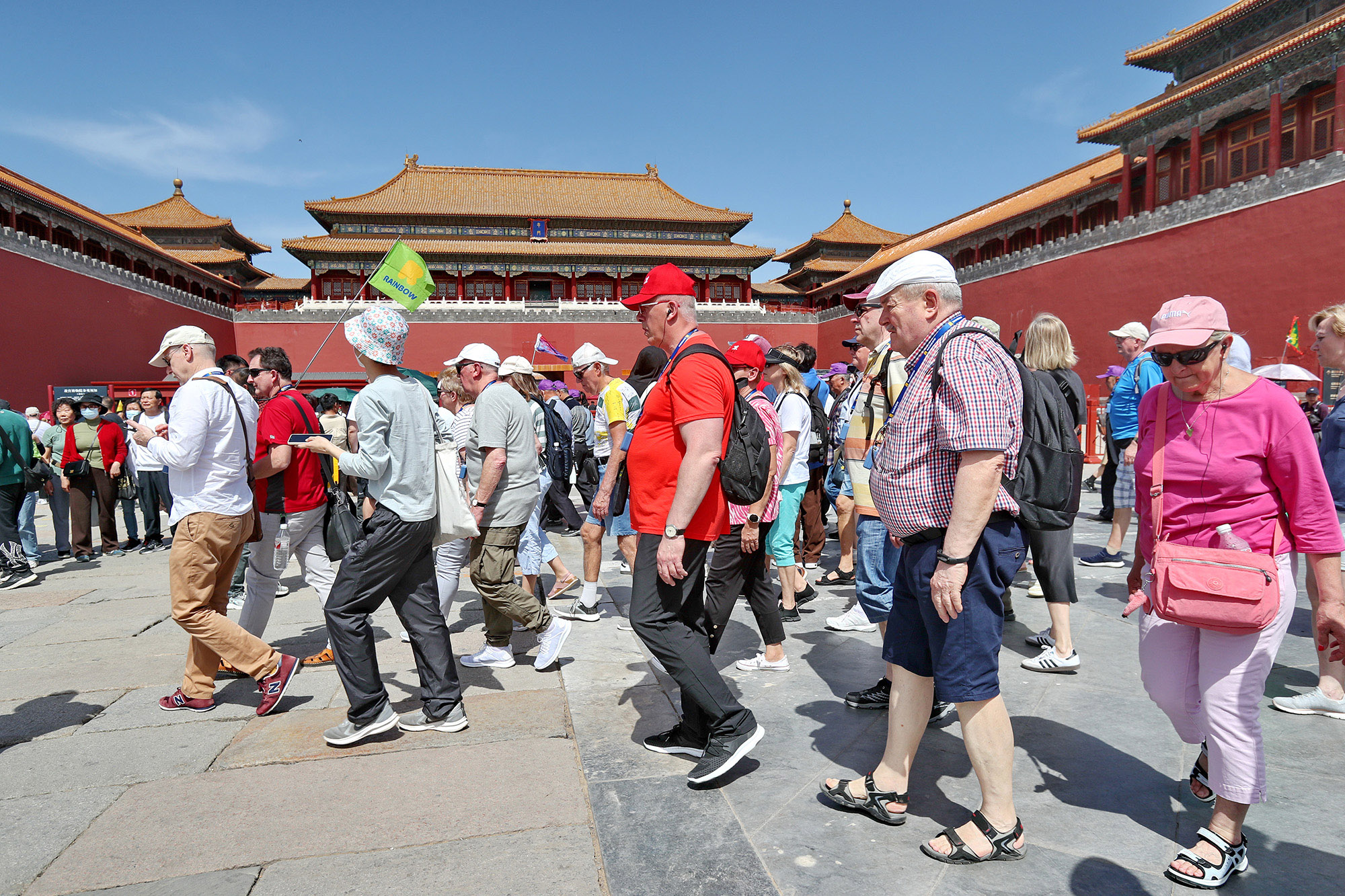
Opening doors
Since March 14, China has granted visa-free entry on a trial basis to visitors from Switzerland, Ireland, Hungary, Austria, Belgium, and Luxembourg.
According to the Foreign Ministry, from March 14 to Nov 30, passport holders from the six countries can enter China without a visa for up to 15 days for business, tourism, family visit, and transit purposes.
In November, visa-free policies were implemented for travelers holding passports from France, Germany, Italy, the Netherlands, Spain and Malaysia.
More than 1,200 tourists, mostly from Germany, Switzerland and Austria, were on board the MS Artania cruise ship, when it docked in Shanghai from March 19 to March 21.
They qualified for unrestricted entry to the country under the visa-free policy, said Hu Jiying from the Beijing-based CYTS Tours, which was in charge of arranging the tour.
The previous 15-day visa-free policy for cruise ship passengers entering Shanghai port would have restricted their stay to the Jiangsu-Zhejiang-Shanghai area, Hu said.
The new visa-free policy allows them to book tours to other destinations in the country such as Beijing. "Despite the tight schedule, passengers enthusiastically signed up for a trip to Beijing," Hu said.
In addition to the 350 guests who took tours in Beijing, other passengers also booked excursions in Shanghai and surrounding areas, she added.
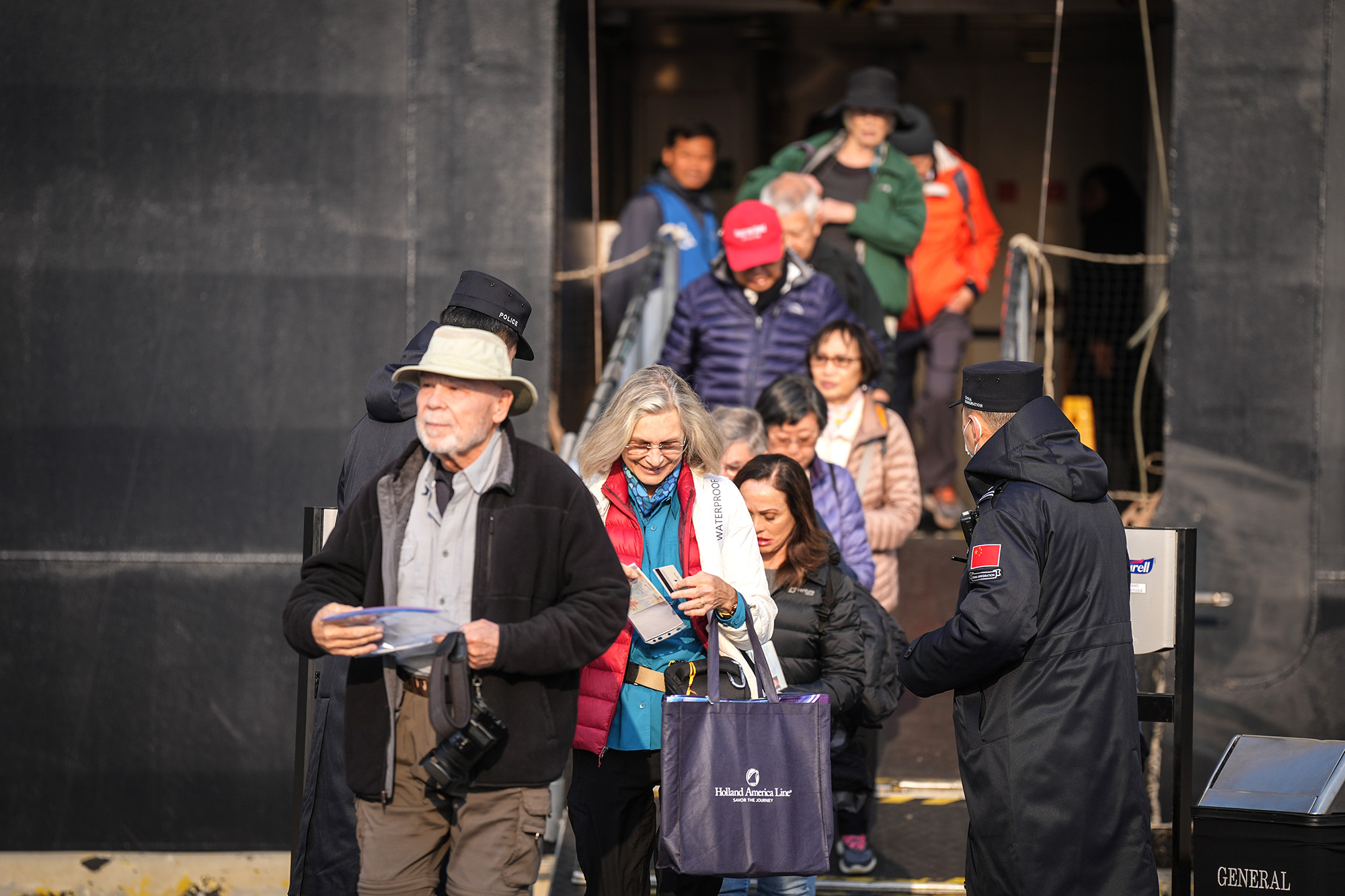
Numbers on the rise
As China's visa-free "circle of friends" has expanded, foreign tourists have shown increasing willingness to visit the country.
On March 10, more than 2,000 travelers from 47 countries and regions arrived in Dalian, Liaoning province, onboard the Zuiderdam cruise ship, operated by the Holland America Line, and took in the city's numerous attractions, ranging from its beautiful parks and beaches to its theaters and museums.
In January and February, nearly 2.95 million entries and exits of foreign nationals were recorded by the National Immigration Administration, according to statistics cited by the Ministry of Culture and Tourism.
During the Spring Festival holiday, the effects of China's visa-free policy became apparent, with a significant increase in visitors from countries newly added to the visa-free list, including France, Germany, Italy, the Netherlands, Spain, Malaysia and Singapore.
The total volume of inbound tours booked on some online travel agency platforms was double that for the same period in 2019, the tourism ministry said.
Since the beginning of this year, inbound tourism orders have increased more than threefold compared with the same period last year, and 50 percent with 2019, said Qin Jing, vice-president of major online travel agency Trip.com Group based in Shanghai.
Inbound hotel bookings have increased more than threefold year-on-year, with a growth rate of over 70 percent compared with 2019. Inbound flight bookings have also seen a more than threefold increase year-on-year, representing a growth rate of over 60 percent compared with 2019, Qin said.
Yu Tong, product manager with CYTS Tours, said recently she has been receiving inbound travel groups in Beijing almost every day. The Palace Museum, the Great Wall, the Temple of Heaven, and the Ming Tombs Reservoir are the most popular destinations for inbound tourists, she said.
"Some of them have also opted for immersive cultural tours, like hiking the Jinshanling and Simatai sections of the Great Wall or exploring deep into hutongs," Yu said.
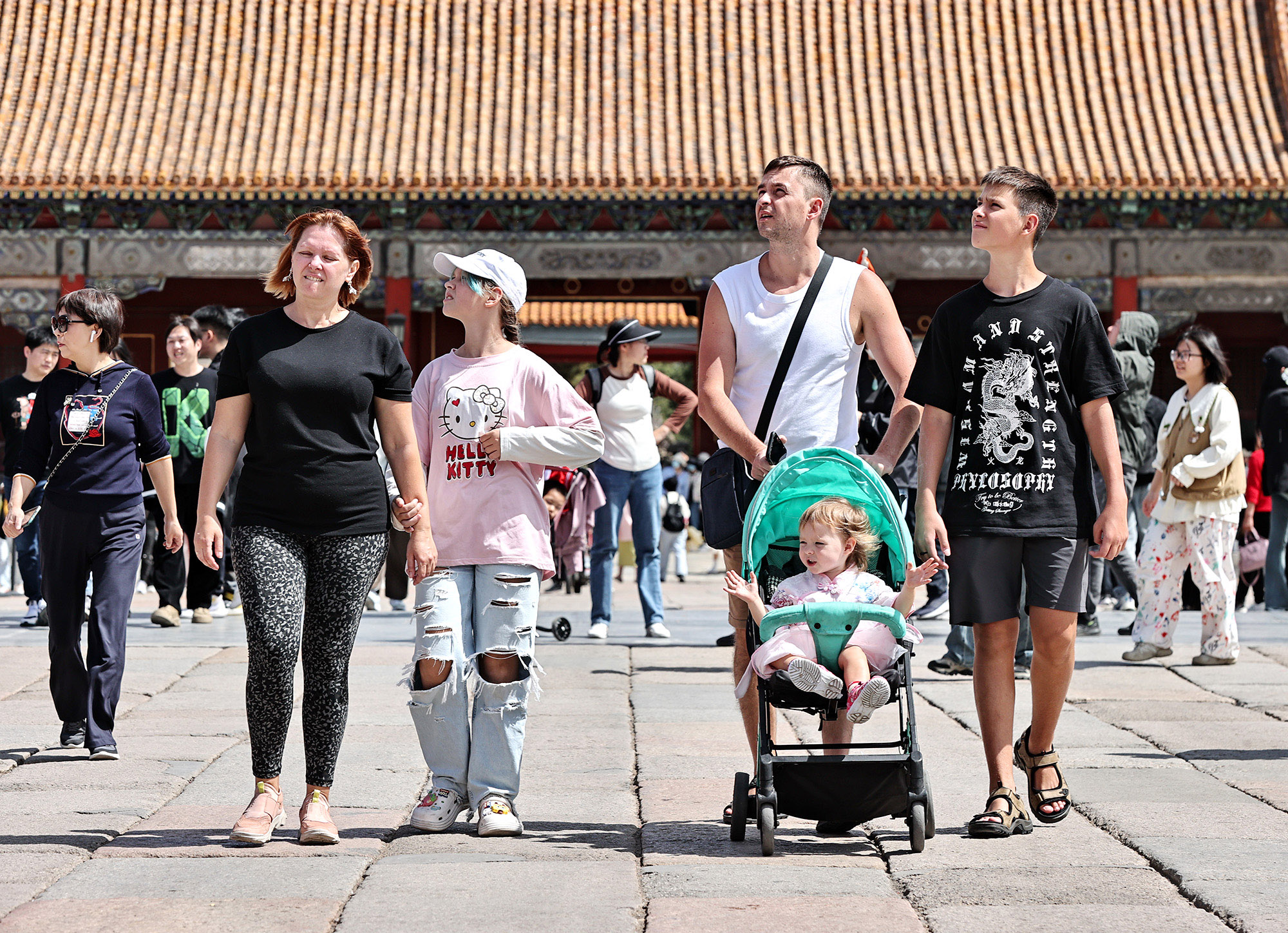
German beer index
Restaurants that cater to overseas travel groups have been in contact with her, hoping to resume business cooperation. Yu cites this as clear evidence inbound tourism is recovering.
Eateries that have long-term agreements with travel agencies will tailor their menus according to the preferences of tourists from different countries, she said.
"For example, German tourists love beer, so the restaurant will provide two bottles of beer for them," Yu said.
Tourism operators have also launched a range of financial services to make the stay of inbound travelers more convenient.
A number of high-end hotels and restaurants in the capital not only accept international credit card payments, but also provide foreign-currency exchange services as many overseas guests prefer to pay in cash.
"Due to the complexity of the process, we have specifically conducted training on manual foreign-currency exchanges," said Zhong Yong, deputy general manager of China World Summit Wing, a Shangri-La hotel in Beijing.
Guests can also use their bank cards to withdraw cash at the self-service foreign-currency exchange machines in the lobby, Zhong added.
However, a rising number of inbound guests want to use local electronic payment services while visiting China. Zhong's hotel guides them on how to link their international credit cards to Alipay and WeChat Pay and how to make payments through them.
Some hotels offer simpler ways for foreign visitors to get cash and also experience Beijing at a more local level. At Huajiantang hotel, tucked away in a Beijing hutong, a guide is available to take guests to nearby banks.
The hotel also provides a map highlighting public transportation as well as call services for emergencies, said Zhu Hailong, the hotel's general manager.
For guests who don't want to go far, Huajiantang gives recommendations on neighborhood sights, shops and restaurants. It also offers guests handicraft classes such as making dolls of Tu'er Ye (the Lord Rabbit).
At Hotel Jen Beijing, inbound travelers are given advice on how to use mobile phones to hail taxis, how to book and purchase tickets for popular attractions, and how to purchase domestic flights and train tickets, and select seats. The goal is to make their trips smoother, said Zhang Lize, a deputy manager at the Hotel Jen.
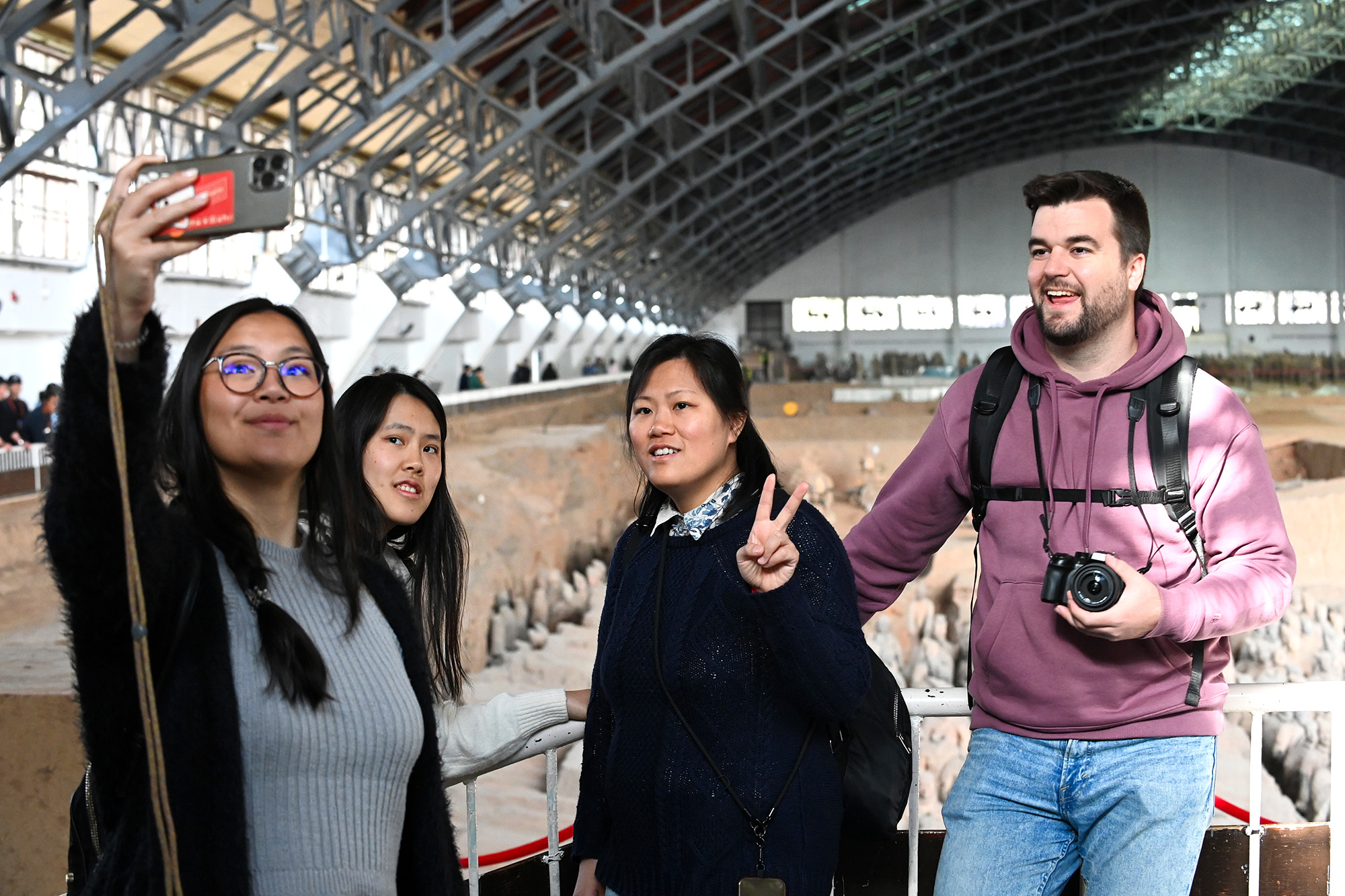
Convenience key
To ensure the recovery continues, tourism officials will launch a series of targeted measures to remedy existing problems in the market.
On March 29, the Ministry of Culture and Tourism said at a news conference it will make it easier for payments at various places such as tourist attractions, cultural and performance venues and star-rated hotels. Inbound tourism products and services will also be stepped up, along with overseas promotions, to better meet inbound travelers' needs.
Wu Kefeng, deputy head of the ministry's Department of Resource Development, said special emphasis was being placed on improving the convenience of payments at key tourist destinations.
This includes promoting the establishment of software and hardware facilities for accepting mobile payments, bank cards, and cash at all national 5A and 4A tourist attractions, national and provincial tourist resorts, and national-level tourist leisure districts, Wu said.
The ministry said it will cooperate with the relevant departments to promote the establishment of foreign-currency exchange service points at tourist resorts and national-level tourist leisure districts with a high number of inbound tourists. It will also encourage nearby bank branches to provide foreign-currency cash exchange services to meet the needs of inbound tourists.
All tourist attractions will retain staffed windows to offer ticket services for inbound travelers, while English-language online reservations will also be available.
"For reservations requiring real-name authentication, foreign passports, permanent residence identity cards, and travel permits for residents of Hong Kong, Macao, and Taiwan to the Chinese mainland will be included in the recognized identification documents," Wu said.
Key tourist attractions will also be encouraged to improve multilingual signage and guide facilities, and to continue improving their foreign-language services.
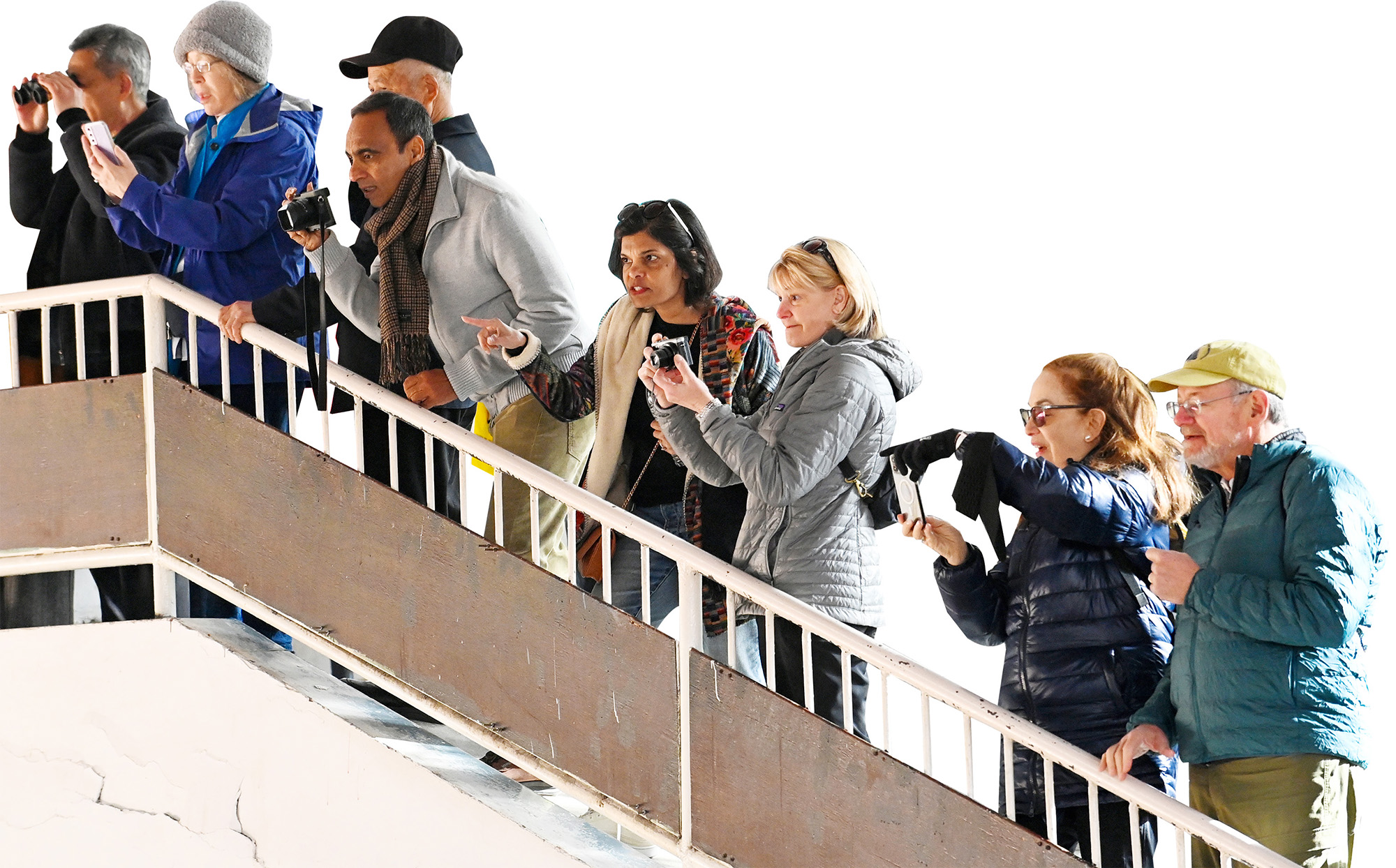
More to come
Edouard Rebilly from Belgium could not take advantage of the visa-free policy before he came to China in late March.
"I had to go to a center in London, and it was quite a long wait, which was a bit annoying," Rebilly said.
The Belgian, in his 20s, came to China to visit friends he met in 2019 during a six-month college exchange program in Hong Kong. On the latest trip he took tours to Guangzhou, Guangdong province, Xi'an, Shaanxi province, and Beijing and Shanghai over about two weeks.
Rebilly said he was drawn to the distinctive culture and food in those cities. "I think every city is very different, and it's very safe to travel here," he said.
As the beneficial travel policies have been unrolled, Rebilly says he's likely to visit again soon. "I will probably check out Zhangjiajie where they filmed the Avatar movie," he said, referring to the spectacular national forest in Hunan province.
Dou Junjie, who for two decades has arranged cycling tours to Beijing's historical and cultural areas such as the Central Axis and hutongs, believes the effects of the positive measures will be fully seen in autumn.
"The guests from abroad we have received have usually made their travel plans at least six to ten months in advance," said Dou, who has received a stream of orders for cycling tours since February.
"If past experience is any reference, September to early November is the peak season. That means if we can align the influence of the policies with the traditional cycle we can expect a very promising scenario," Dou said.


